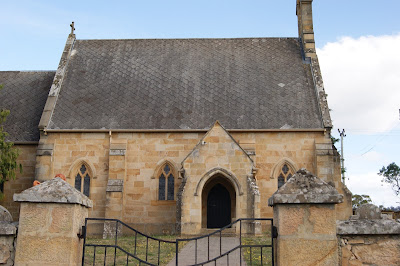The importance of St John the
Baptist Church
is partly its age - it was built in 1846 to a design by architect Crawford
Cripps Wegman of Sussex , England - and
its East Window. There has been much speculation about the age of the East
Window with some people claiming that it was originally designed for Battle
Abbey in England ,
a church which dates from 1094. The church building was commenced in 1846 after
the local population complained to secular authorities in Hobart about the lack of any clergy to
service the growing settlement of Prosser Plains. Local businessmen had pledged
to select a suitable plot of land for the purpose of erecting a temporary place
of worship. This became the St Georges church which is believed to have been
located at the old churchyard on the opposite side of the road to the current
property and was completed in 1828,
In 1840, the congregation received a grant of 25 pounds
towards the erection of a new church. It wasn’t until March 1846 that the first
Chaplain, Rev F.H.Cox arrived in the region to take up his chaplaincy and
commence works on the new church.
By now the settlement had been renamed Buckland by the then
Governor, Sir John Franklin, who named the settlement after the famed
geologist, Dean Buckland. From March till October 1846, Rev Cox conducted his
services at the local Police Magistrates office while the church was being
constructed. The foundation stone was laid on 12th August 1846.
Records of those earlier days give no account of the progress of construction
of the church or as to whether it was built by free settlers or convicts.
However, it is known that the church was a replica of a parish church in England , namely Cookham Dean in the Rev Cox’s
native county of Sussex
The story is that before the famous Battle of Hastings,
which was actually fought at Battle in Sussex ,
William the Conqueror vowed that if he won he would build an abbey to
commemorate his victory. Legend has it that he built the Abbey where the
English King Harold II had fallen. The abbey was destroyed during the
Reformation by troops loyal to Oliver Cromwell in the early 1600s. The main stained
glass window from the abbey seems to have fallen into the hands of the Cecil
family who had close connections with the district.
Experts believe the window in St John
the Baptist Church Australia
when he emigrated from Sussex .
One account has Lord Robert Cecil, the British Secretary of State for the
Colonies, giving the window to Cox before he departed from England .
Whatever the story it is still remarkable to see a fourteenth century church
window in a church which wasn't built until 1846.
June 18th 1848 saw the very first service held in
the new church building and on Jan 15th the following year, the
Bishop of Hobart, Bishop Nixon arrived to officially consecrate the new church.
The stone walls surrounding the churchyard were added at a later date. It was
estimated that the cost of erecting the church, exclusive of interior ornamental
features was about 900 pounds, half of which was contributed from public funds
and the other half from contributions from neighborhood parishioners.
The
church is active to this day and is in amazing condition considering its age.
It plays an active part in the local community and is easily visible in a
prominent part of Buckland as you pass through on the Tasman Highway . The church has easy
access inside where you can view the magnificent interior and view the majestic
stained glass window. Historical information booklets and cards can be
purchased in the church by placing your donation in the box supplied. (Honesty
System applies). A beautiful little colonial church with is storied stained
glass window. Well worth a visit as you pass through Buckland.
## Text & Information for this post from the booklet printed by the Parish of
Buckland##
“Church of St. John












